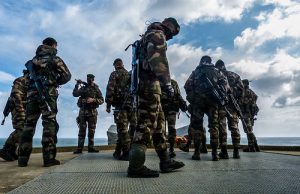Mercenaries are individuals that are hired to take part in a war or armed conflict who are not a citizen or otherwise a resident of the nations at war. They are traditionally motivated to fight for financial or other private gain by one side in the conflict. The compensation paid to mercenaries typically exceeds that paid to national armies due to the specialized skills the mercenary possesses as well as the increased personal risk the soldier entails by fighting under this status. Despite the potential pitfalls, mercenary work is attractive to many young men for the travel, adventure, and high pay. As a result, seeking out available mercenary training is necessary for many to help bridge the gap between their military and/or police experience and obtaining high paying mercenary jobs.
Why Do Mercenaries Incur More Risk than Traditional Soldiers?
Mercenaries have garnered a bad name over history since they are seen as “hired thugs” by the nations or populaces that have had to face them on the field of battle. As a result, Article 47 of the Geneva Convention was passed which does not provide the rights of prisoners of war to mercenaries. More recently, the U.N. passed the Convention against the Recruitment, Use, Financing, and Training of Mercenaries in 1989 banning the practice; however, the United States and United Kingdom notably did not ratify the convention. Some “mercenary” units such as the French Foreign Legion are not considered mercenaries since they make use of “foreign volunteers,” although that enters a gray area in the definition of a mercenary. Many private military companies such as Academi make the argument that their security personnel are hired to provide support work and are not front-line troops and thus should not be considered mercenaries by the U.N. definition. Regardless, those taking work in the mercenary field need to know what could be in store for them in the event they end up on the wrong side of a conflict.
What are the Commonly Sought out Mercenary Skills?
At the start of the age of organized warfare, being a mercenary could simply mean that one was a trained foot soldier with his own gear. This grew

to organized groups or units from countries hiring out their services and was accompanied by the equivalent knowledge of the soldiers in gunnery, explosives, and as warfare increased in complexity, mortars and explosives. Today, the modern mercenary can be an expert in these and other skill sets to include aviation, UAVs, and general intelligence services. Many of the jobs in the mercenary field typically seek out skillsets found in the Special Forces, infantry, and security services of the various armed forces of both the United States and other modern militaries and police forces.
How to Prepare for Mercenary Work
Just because a young man is a good street fighter or even proper boxer, doesn’t mean that he will make a good mercenary. The majority of private military companies who provide mercenary-like work rarely hirer personnel who have zero military or police experience. Despite some rumors and propaganda to the contrary, the best starting part to develop the baseline experience required to be a mercenary is to join the armed forces or national police in your country. If able to obtain a posting to a Special Forces or infantry unit, go that route since the land warfare skillsets typically translate better to the mercenary job skills you will be seeking out. If those occupational specialties are not available to you, then seek out one in a security related field such as military police. You will likely find that you need to have between three and five years of experience before you can make use of your military training, so make sure you don’t sign up for too short or too long of a time period based on your personal goals in the mercenary job field!
Step 1 – If you are still active duty, start increasing your physical training to meet the special forces testing standard approximately one year before you are due to leave the military. Note that the army minimum of 229 on the test should probably be ignored. You will want to be able to perform at or above the 275 level to be taken seriously if attempting to obtain a high paying mercenary job coming out of the regular infantry or other security related fields that are not SF.
Step 2 – While you are preparing physically, start to pick-up language proficiency in a language other than English if time permits. Language skills in the countries of potential employers will potentially make you more attractive to hirer, and in some cases can result in higher pay! Some of the “At Home” programs that you can use are the Rosetta Stone and Rocket Languages.
Step 3 – If you are still active duty, ensure your security clearance will remain valid for at least a year after you leave the armed forces. This will give you a significant advantage going head-to-head against an equally (or sometimes better) qualified candidate without one for obtaining private military company work servicing government contracts.
Step 4 – Ensure you obtain a copy of all certificates of training for security-related training you have received in the military prior to leaving the service. Most private military or security companies will ask you to upload copies of this training as part of the resume submission process. If you do not have the certificates, you may still be able to obtain credit for the training; however, there are no guarantees that this will occur in the timeframe that you need it for the job application.
Step 5 – If you do not have a passport, or it will expire within the next year, get one or apply for a new one. Sometimes it can take up to 60 days to obtain a passport, so ensure you plan accordingly since most mercenary work will be outside of the country that you currently reside!
Step 6 – If your driver’s license will expire in the next year, renew it. The majority of private security / military companies will require that you have a valid license in order to obtain work. Some companies may also want you to have an international license in hand as well which typically take 10-15 dollars to obtain through AAA or your car insurance company.
Step 7 – Ensure you have a hard and soft copy of your DD-214 if you have previously served in the military as well as your birth certificate.
Commercially Available Mercenary Skill Training
There are a large number of commercially available, legitimate mercenary skill training courses available in the United States and other western nations. These include courses in varying levels of difficulty in shooting (pistol, shotgun, and rifle), armorer courses, defensive driving (on and off road), various law enforcement skills, sniper courses, and a range of high value individual protection classes to include home defense, executive protection, individual personnel protection, and high risk security details. The courses will range in cost from $500 to several thousand dollars U.S. depending on the company you take the class from. If you decide to take a course from a potential employer, ensure 1 – You are on your “A” game while taking the class, and 2 – You use the opportunity to network with your future employer during the course. If all goes well, you could very well find insights to job possibilities that may or may not be listed online.
Should You Consider Attending an Executive Protection Courses?
It really depends on your background from the military or police force. Academi offers both a basic and advanced corporate course focused on the basic principles of executive protection. The training days are long (12 hours or more some days), and it will cost you more than a car payment to attend. The benefits of attending the basic and/or advanced course either from Academi or other private security contractors can be significant. During the course of instruction, the mentors/facilitators will start the students off on the basic principles of executive protection, threat and risk assessment analysis, residential and travel security, and how to properly plan advances, surveys, and preparations for trips.
In addition to training you how to play for executive protection during travel, the cours(es) will also provide instruction on open-hand defensive tactics, protection formations, radio communications, and motorcade procedures. Building on the classroom work, the Academi course will take the students through an in-town practical exercise where students will put the classroom work into practice. Other topics include the proper dress and etiquette to provide VIP security, command post procedures, and how to provide protection during restaurant or banquet functions. Most basic courses do not have significant pre-requisites other than basic small arms familiarity and sometimes qualifications, so ensure you verify these requirements before potentially wasting your money on signing up for a course that you may or may not be able to complete!
Do You Need to Have Small Arms Qualifications to Be a Mercenary?
It really depends on the company and / or job that you are applying for. At the bare minimum, you should have your military gun qualifications to provide as part of the job application process. The greater the number of weapons that you have documented proficiency in can be a game changer when applying for highly sought-after private security or military gigs in the current employment environment. Some companies will want you to have the proper license to carry a handgun for the state that they company HQ or primary training facility is located (or a license in a state that their state recognizes). Others may want to see course completion certificates for basic through advanced classes offered by either their or competing companies. Best to do your homework and ensure you have well above the minimum required skill level before applying for private military gigs that are located in potentially austere locations!




